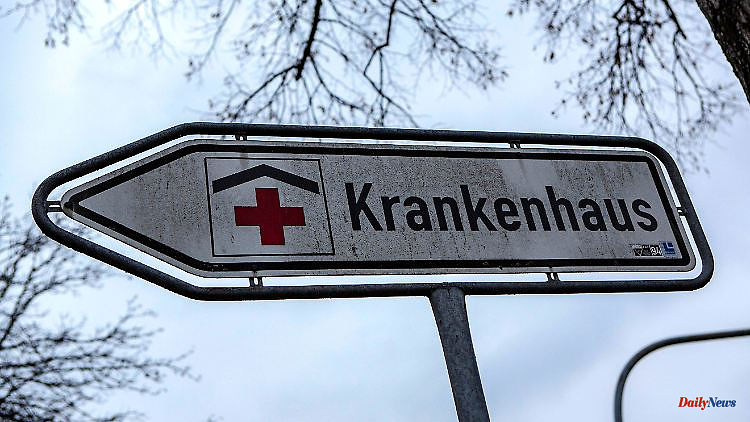The situation of German hospitals is critical. They are now in the intensive care unit themselves, says Health Minister Karl Lauterbach. In an interview with ntv.de, health economist Andreas Beivers explains why the clinics are chronically ill and why reforming the system is likely to be complicated.
ntv.de: At the beginning of the year, the German Hospital Society warned of an approaching wave of bankruptcies. Why are German hospitals doing chronically poorly?
Andreas Beivers: For years we have been spending more and more money on the healthcare system - not less. The expenditures of the statutory health insurance funds have continued to rise over the past 20 years. But the German hospital landscape has been suffering from various problems for some time. Corona has not changed that much, but the situation has worsened significantly together with inflation. It's really serious.
Where do you see the basic problem?
Since the 1970s, German hospitals have been financed from two sources: one of them is the federal states. According to the law, they are obliged to use tax money to cover the long-term investment costs of the clinics, such as for the equipment, the building structure or other infrastructure. Each federal state regularly issues a hospital plan, which contains all the clinics that are necessary for the care of the population. Put simply, these clinics then have a legal claim to the money.
And the second source?
The health insurance companies are responsible for the second half, i.e. the operating costs. Since the beginning of the 2000s, these have been financed via case flat rates. To put it simply, clinics have since been remunerated primarily based on the number of cases vomited.
And this system no longer works?
The problem is that many countries have spent too little funding on their clinics for a long time. This had dramatic consequences for the infrastructure. The investment funding gap is in the tens of billions. In addition, the German hospital landscape has grown historically, some hospitals have been around for 30 to 40 years.
Why is this a problem?
As fewer and fewer people live in rural areas, medicine has also developed. For example, an appendix operation: 40 years ago, doctors cut open the patient's entire abdomen; today, this is operated on endoscopically with just a few incisions. People used to stay in the hospital for ten days, now it's only two to three - some may even have outpatient surgery. So medicine is modern, the infrastructure is very decentralized and outdated in many areas, causing immense problems.
What can the clinics do about this dilemma?
At some point, the clinics tried to compensate for the investment backlog with more and more cases. To a certain extent, they were able to settle their operating costs via the flat rate per case. So they tried to earn money in a system where there was actually nothing more to be gained - and at the same time started to save. So the money from the health insurance companies, which is actually intended for everyday use, suddenly had to be enough for the long-term costs.
Then there was the pandemic three years ago. What did Corona do to the system?
Many hospitals were already in the red before the corona pandemic. A clinic has an incredible number of fixed costs, for example for the building or equipment. And during the pandemic, they also had to keep beds free for Covid patients. This meant that they were able to treat fewer patients overall, and a source of income was lost. Nevertheless - and the contradiction may sound paradoxical - hospitals on average did even better during the pandemic. You have received money from the state for keeping beds free - the so-called free-keeping allowances. It's no longer there, and that's a problem now.
What's the problem?
The number of patients will also decrease in the long term after the corona pandemic. There are various reasons for this: examinations were cancelled, patients then no longer made up for them. At the same time, inflation is causing costs to rise, and the shortage of skilled workers is also limiting treatment capacities. Some beds can no longer be operated because there are no nursing staff. This also explains part of the decline in patients.
The list of problems seems endless.
And in 2019 there was a reform of the medical service of the health insurance companies. This means that hospitals should carry out operations on an outpatient basis, i.e. fewer patients should stay overnight. As a result, many clinics earn less money in the short term and are left with the high costs. And that puts a lot of clinics in dramatic imbalances.
Health Minister Karl Lauterbach has now announced a "revolution" in hospitals. How should it look?
Health Minister Lauterbach and the government commission have to drill a pretty thick board. And with the proposals that are currently on the table, things may become even more bureaucratic.
What does that mean specifically?
The hospitals should get out of the hamster wheel of having to finance themselves with more and more patients. This means that not every clinic offers all services. Anyone who specializes in an operation will perform it more often. Also, the money for the fixed costs should no longer depend on how many cases a hospital treats. And: There should continue to be incentives for clinics that work more to earn more money.
The pressure seems enormous: on the one hand, a wave of bankruptcies is looming, on the other hand, the system is too complex for quick fixes.
Absolutely. That's why we shouldn't criticize all of the Commission's proposals right now, because not everything will be implemented in the same way. But: Large parts of the ideas have been discussed for some time, some are common sense in science. But there is still a long way to go before the law is passed: It may happen that this also restricts state competences, in which case the Bundesrat must also agree. That could get complicated.
The legislative process could take a while, but the clinics are already suffering. How can we prevent hospitals from going bankrupt now that will be needed later?
There is already a kind of bridge solution. In the case of some case flat rates, the hospitals are free to decide whether to bill for this with or without a bed. But if they then do it as a day clinic, they get a discount. The other is that new, so-called hybrid payment methods are calculated for the clinics. So that those who do not treat patients as inpatients, i.e. without a bed, also earn enough money.
What does this mean for patients?
The aim must be for patients who are in a hospital ward to leave the clinic again quickly. Let's not fool ourselves: It also happens that patients are treated as inpatients because they can be billed better. At the same time, however, the biggest deficiency remains: the staff. A kind of focus is therefore needed. If patients were to be treated in outpatient centers in the future, the existing staff could be better distributed. Then the job will be more attractive. People would not have to work in shifts, instead there would be hospitals that operate from nine to five, and other clinics that take care of aftercare.
It is difficult for me to imagine that a district administrator would allow his hospital to be closed.
I've been dealing with this point for a long time. The health system is not an end in itself, nor does it allow for populism. All criticisms are justified, but we have to be careful that the system doesn't blow up in our ears and that we can still provide decent care for people in the future. That's the incentive behind every reform: We want to save what is actually a good system, even though we have fewer and fewer resources - whether financial or in terms of staff. If we centralize hospitals, then we also need a sensible aftercare system. In the country you can't just throw an 80-year-old out on the street after an operation. We need a network there, a kind of supply hub in the regions. There are no doctors there, but maybe trained nurses.
Sebastian Schneider spoke to Andreas Beivers












